[Paper-2 : SOCIOLOGY OPTIONAL ] : UPSC MAINS CIVIL SERVICES IAS EXAM 2023 QUESTION PAPER
“ Sociology Paper 2 2023 ”
UPSC CSE MAINS 2023
SOCIOLOGY Paper 2 2023
Marks : 250
Duration: 3 hours
Exam Date: 24-09-2023
Subject: Sociology Paper 2 2023
SOCIOLOGY PAPER 2 2023
SECTION A
Question no 1: Write short answers, with a sociological perspective, on the following questions in about 150 words each: 10×5=50
-
- Highlight the significant features of A. R. Desai’s ‘Dialectical Perspective’ to study Indian Society. 10
- “The decade of 1950s was the golden period of village studies in Indian Sociology. Explain the statement. 10
- Analyse the differences between the attributional and interactional approach in studying the caste system. 10
- Are Tradition and Modernity antithetical to each other? Comment. 10
- Discuss the main features of Land Reforms in post-independence India. 10
Question no 2.
-
- Do you agree with the view of Andre Beteille that India’s villages are representative of Indian society’s basic civilizational values? Present a sociological overview. 20
- Elaborate the salient features and the role of middle class in India’s democracy and development. 20
- Analyse the role of market and modern forces in understanding the changing trends in marriage systems in India. 10
Question no 3.
-
- Contextualize Louis Dumont’s concept of binary opposition’ with reference to caste system in India. 20
- Define the concepts of ‘Descent’ and ‘Alliance’. Differentiate between North Indian and South Indian Kinship systems with examples. 20
- Critically examine the concept of Sanskritization with suitable illustrations. 10
Question no 4.
-
- Analyse the perspectives of Isolation, Assimilation and Integration in understanding the trajectories of Indian Tribal Development. 20
- Explain the implications and the impact of globalization in situating the changing agrarian class structure in India. 20
- Critique the victory narratives of Green Revolution in the context of Indian society. 10
SECTION B
Question no 5. Write short answers, with a sociological perspective, on the following questions in about 150 words each: 10×5=50
-
- Citing some case studies, expand the concept of ‘Development-induced Displacement’. 10
- Examine the concept of ‘Cultural Pluralism’ in the context of India’s Unity in Diversity. 10
- Highlight the salient features of the New Education Policy (NEP) 2020 10
- Analyse the sociological interconnections between Social Media and Mass Mobilization in India. 10
- Discuss the nature of regional variations in sex ratio in India, stating reasons thereof. 10
Question no 6.
-
- How do you account for the increasing significance of religion in public and personal spheres in the context of secularization thesis in India? Explain. 20
- In the face of rising global climatic concerns, how do you contextualize the relevance of Chipko Movement and its Gandhian tone? Answer analytically. 20
- What actionable measures would you suggest to curb the recurrent child labour [menace in India ? 10
Question no 7.
-
- Do you think that the decades of Dalit political mobilizations and movements have helped in strengthening India’s democracy? Substantiate your arguments with facts. 20
- What is ‘reverse migration’ ? Discuss its features, causes and consequences in India. 20
- Discuss the phenomenon of rural-urban continuum with suitable examples. 10
Question no 8.
-
- Explain the thematic linkages between ‘Patriarchy’ and ‘Honour killing’ in India, citing some recent cases. 20
- Discuss the challenges faced by the cooperative movements in India. Suggest measures to strengthen the movement at the grass-roots level. 20
- What is Ageing’ ? Discuss the major problems of aged people in India. 10
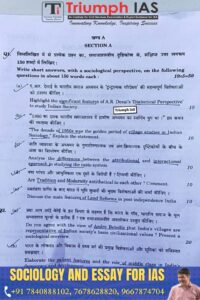
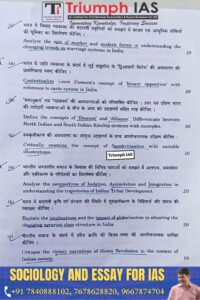
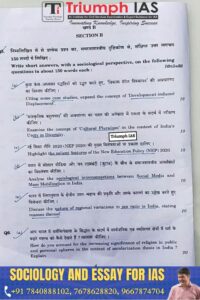
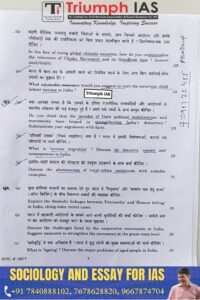
| UPSC Sociology Optional Previous Year Question Papers | |
| Year | UPSC Sociology Optional Question Papers PDF Link |
| 2023 | |
| 2022 | |
| 2021 | |
| 2020 | |
| 2019 | |
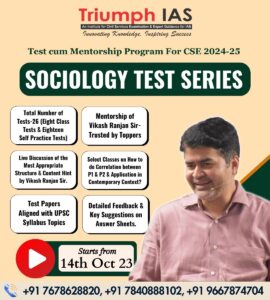
Triumph IAS: The Best Sociology Optional Coaching
and Teacher for UPSC Sociology Optional Paper 2023
When it comes to the UPSC Sociology optional subject for the year 2023, candidates will be dealing with two papers, namely Paper I and Paper II. Each of these papers carries a substantial weightage of 250 marks, resulting in a total of 500 marks dedicated to this particular optional subject. Among the plethora of optional subjects offered by UPSC, Sociology stands out as one of the 48 choices available to aspiring candidates.
The examination schedule for the UPSC Civil Services Mains for September 23, 2023, includes Paper-A in Indian Language and Paper-B in English. Following this, candidates will face Optional Subject-Paper-1 (Paper-VIII) and Optional Subject-Paper-2 (Paper-IX) on September 24, 2023.
Triumph IAS, renowned as the Best Sociology Optional Coaching and Teacher, ensures that candidates are well-prepared for the challenges of UPSC Sociology Optional Paper 1. This paper encompasses a wide array of topics, including the foundational principles of sociology, the influential sociological thinkers who have made significant contributions to the field, and various sociological theories. The primary aim of this paper is to evaluate candidates’ theoretical grasp of sociology.
Moving on to UPSC Sociology Optional Paper 2, Triumph IAS continues to shine as the best coaching and teacher for this subject. Paper 2 delves into the practical application of sociological theories to contemporary social issues. It encompasses subjects like Indian society, social change, and development, among others. The main objective of this paper is to assess candidates’ capacity to analyze and provide insightful sociological perspectives on current societal challenges.
In conclusion, when it comes to excelling in the UPSC Sociology Optional Paper 2023, Triumph IAS stands out as the best coaching and teacher, equipping candidates with the knowledge and skills needed to triumph in this significant examination.
Sociology Optional Trend Analysis 2023
Download Sociology Trend Analysis 2023 UPSC
| Dear Aspirants, In sociology optional, there are limited number of theories & only six thinkers. There are limited number of concepts & facts. UPSC-IAS aspirants should understand concepts, thinkers/theories & social facts and simply do brainstorming on possible solution/answer of the question in examination. Do more and more topical backward linkage and forward linkage. Do more and more theoretical-conceptual and factual co-relation. Every individual has Sociological imaginations. While doing preparation or revision, you should simply colour your Sociological Imaginations with Concepts & Theories of the Sociological Thinkers & Structural facts. Application of Theory and Concepts with reference to Indian social facts are common type of analytical writing. In Sociology UPSC Evaluators expect you to apply sociological theories (sometimes called “perspectives” or “arguments”) to empirical phenomena called social facts. In Paper 1 try to write 2 to 3 Current Social, Economic, Political, Educational, Religious, Cultural Social Facts referring to General Studies Syllabus. However, Never try to write more than five Sentences of Current Relevance. You are writing Sociology Answers, so Visibility of Sociological Keywords are Important. Just to bring Novelty in Answers, apart from doing Co-relation You can write few Current points.Note: Sociology is systematic and scientific study of Society-social structure, system and Interaction in systematic manner. So systematize your answer with theoretical, conceptual orientation on structure, system & interaction. Please don’t make it a Current Affairs note writing phenomena. Don’t get into trap of Social-Media sensation of Current-Sociology. It’s a bad trap. Focus on Theories, Concept and Social Facts – traditional and modern related to the past and contemporary society. |
How to Structure Answer in Sociology? – Vikash Ranjan
- UPSC OPTIONAL or GENERAL STUDIES LEVEL writing is different than writing in high school, college and university because you are asked to THINK in little more complex ways. Apart from developing your capacity to obtain knowledge, understanding, and application, UPSC – COMPETITIVE WRITING pushes you up towards the more complex skills of analysis, synthesis and evaluation while structuring the answers.
- After preliminary test focus on Revision & Listing of “Topic wise Keywords- Conceptual Terms, Theoretical Dimensions and social facts” for writing a good answers.
- You should not stuck on 3 to 4 Peripheral-Non-sociological Questions in each paper of Sociology Optional. You have to write 19 Questions, out of which 15 to 16 Questions will be “Direct Topical Questions” related to “Fundamentals of Sociology in Paper 1” and “Indian Social Structure and Change” in Paper 2. Give your best in answer of such questions. And try to manage Peripheral-Non-sociological Questions with application of Theoretical-conceptual strands.
- Be more careful in Structural part of your Answer. Structure your Answers in Parts:-
(1) First Part- Introduction
(2) Second Part- Main Body [Thesis, Antithesis (Critique/Limitation)]
(3) Third Part- Conclusion — Synthesis
- In Introduction directly address the question, briefly explain the key Concept or Theoretical dimension. Avoid writing much on background and glorifying the thinkers academic achievement. It should Constitute 20 Percent of the total length of the Answer.
- In Thesis Part elaborate on the concept or theory or social fact asked in the question. Highlight the Thinkers, Scholars View or Perspective to enrich and substantiate the Answer. If the Question has Keywords like “Discuss”, “Describe”, “Explain”, “Elaborate” etc., then Thesis Part must be detal and Antithesis (Critique or Limitations) should be brief. If the Question has Keywords like “Critically Examine” or “Critically Analyse” etc., then Thesis part should be brief and Antithesis should be discussed in detail.
- In Antithesis Part try to write a Critique to Main Theoretical – Conceptual Arguments asked in questions. By writing Antithesis, you present alternative explanations or views on the topic on which the question has been asked. Length of thesis and Antithesis part will depend on demand of the question.
- Conclusion or Synthesis Part must reflect your overall Conceptual-Theoretical-Applied Understanding of not only the topic rather the Subject. Don’t write your personal opinion about the Theme or the Topic or the Issues in this part. Rather try to give academic and applied insights and try to make it more contemporary by giving references and describing relevance.
Common Pitfalls to Avoid in Sociology Answer Writing: Vikash Ranjan
- FLAWED ARGUMENTS
Avoid three common flawed sociological arguments: arguing only from the perspective of the individual while ignoring social conditions, attributing patterns in behaviour to “human nature,” and explaining behaviour as caused by “society” in general without looking at the societal processes at work. - EXCESSIVE SUMMARIZING/LACK of ANALYSIS
Your task is to move beyond mere summary to help a reader understand your evaluation and analysis of the Social Facts/Concepts/Theory. - LACK OF AN ADEQUATELY COMPLEX THESES
A good thesis moves your reader beyond a simple observation. It asserts an arguable perspective that requires some AS work on your part to demonstrate its validity. - LACK OF ADEQUATE SUPPORT
A well-crafted thesis requires substantiation in the form of acceptable evidence. Often, if your thesis doesn’t make a complex, arguable claim, the act of substantiation becomes difficult. Take care to develop a thesis that will require purposeful use of evidence. - USE OF UNRELIABLE ELECTRONIC SOURCES
Take care to rigorously evaluate your sources, particularly ones from the Internet. Avoid Using of Unnecessary Current Facts as Suggested by Telegram Innovators. The Purpose of hyper Sociological Linkage of Current News with the Theory is to Impress Students for building Telegram Audience for Marketing and Business. - USE OF PERSONAL OPINION OR ANECDOTES
Personal opinions or anecdotes generally do not qualify as rigorous and appropriate sociological evidence in support of a claim. Your opinion does not qualify as data. - IMPROPER USE OF A THEORY
If you are applying or testing a particular theory, be sure you have a good understanding of this theory. - EXCESSIVE QUOTING
When quoting a source in order to provide evidence, use only the relevant part of the quotation. When you establish a claim/assertion and provide textual support, be sure to explain the relationship between the quotation and the assertion. Your reader can’t read your mind. - SHIFTING VERB TENSE
Take care to shift verb tense only when necessary. Science’s strong sense of timing requires that you accurately that you accurately reflect that research was performed in that past and that certain knowledge is current. - PASSIVE VOICE
Use active voice as often as possible. Active voice generally is more concise and lively than passive voice. - REFERENCE TO THE AUTHOR BY HIS/HER FIRST NAME
It is customary and respectful to refer to the author using his/her last name.
Happy Reading, Happy Revision!
All the Best!
Sociology Optional Trend Analysis 2023
Download the Sociology Paper 1 2023 UPSC
Download the GS 4 Paper 2023 UPSC
Download the GS 3 Paper 2023 UPSC
Download the GS 2 Paper 2023 UPSC
Download the GS 1 Paper 2023 UPSC
Download the Essay 2023 Paper UPSC
Follow us :


https://t.me/VikashRanjanSociology
Find More Blogs
|
Scope of the subject and comparison with other social sciences |
|||
|
|
|
|
Modernity and social changes in Europe |
sociology paper 2 2023, sociology paper 2 2023 upsc, sociology paper 2 2023 questions, sociology paper 2 2023 answers, sociology paper 2 syllabus, what is sociology paper 2, sociology paper syllabus, 2023 sociology paper, upsc sociology paper 2 2023, upsc sociology paper 2 2022, sociology paper 2 2023, sociology optional paper 2 2023, sociology paper 2 2023, Sociology Paper 2 2023, Sociology Paper 2 2023, Sociology Paper 2 2023, Sociology Paper 2 2023, Sociology Paper 2 2023, Sociology Paper 2 2023, Sociology Paper 2 2023, Sociology Paper 2 2023, Sociology Paper 2 2023, Sociology Paper 2 2023

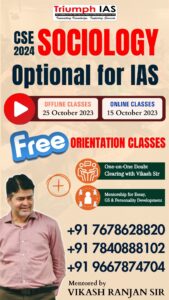

3 comments